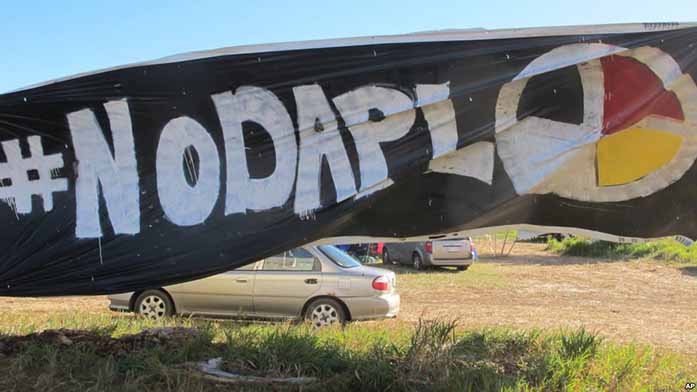Anti-North Dakota Access Pipeline activists met Monday to discuss the cause.
By Naomi Hofferber
Activists against the Dakota Access Pipeline met in the Iowa City Public Library Monday night to discuss the movement, what has been done, and what is to come.
“The Dakota Access pipeline is nearly complete in Illinois and South Dakota,” said Jason Livingston, an activist and the facilitator of the meeting. “The pipeline is still under construction in North Dakota and in Iowa. If we’re going to stop the pipeline, the time is now.”
Activists from the group have protested in locations in Boone, Iowa, and Lee County, where pipeline construction is taking place, and they planned various protests and events in the coming month.
The pipeline is set to finish construction in Iowa by Oct. 31, leaving roughly a month for the activists to prevent or impede its construction.
“I believe that we should fight this pipeline in solidarity with the Standing Rock, in solidarity with the farmers in Iowa who’ve had their land taken through eminent domain, and to protect the water and the soil of this good Earth,” Livingston said.
He also noted the risk of running a pipeline underneath the Missouri River twice, the Des Moines River, and the Mississippi River.
Dawson Davenport, co-chair of the University of Iowa Native American Student Association, said the issue could provide learning opportunities for university students.
“This issue is a real-world education; there are a lot of issues at play, and it’s more than just a pipeline,” he said. “There are human-rights issues, legal issues, all kinds of issues people need to be aware of and pay attention to. The government is impeding on the rights of people — not just Native Americans.”
One of the ways UI students can get involved is by educating themselves on the matter, and speaking out against it.
“Make your voice heard. It’s one of the most important things that we have as citizens of this country, our right to be heard, our right to stand up for things,” Davenport said. “If you really care about humans, and water, and the planet, you need to get involved with this; you need to say something.”
The group plans on raising awareness for the issue through events, including an event Friday, with various bands and speakers on the issue.
UI alumna Christine Nobiss has helped raise awareness for this issue on the internet and social media, and she wants to get Native Americans in Iowa involved in the issue.
“There are 14,000 Native Americans living in Iowa right now, and my goal is to get a collective voice together of these natives,” she said. “We need to find each other, we need to get together, we need to communicate, we need to work on this issue together.”
Her goal is to create an Iowa indigenous environmental network, similarly to the Indigenous Environmental Network that exists but specific to Iowa.
Many social issues come into play with the pipeline, including racial issues, Nobiss said, noting the difference in treatment of protesters at Standing Rock in North Dakota and those in Iowa.
“When brown people get agitated, settler anxiety really settles in. That is huge to this,” she said. “We need to start addressing that and white privilege. I’m so glad people in Iowa are willing to get arrested [for the cause], but there’s so much more to this than just that.”
The pipeline has been debated in the judicial system for potentially breaking Native American treaties and agreements.
“We’ve got to raise our fists and put our bodies in front of the machines,” Livingston said. “I think we can shut this down.”







